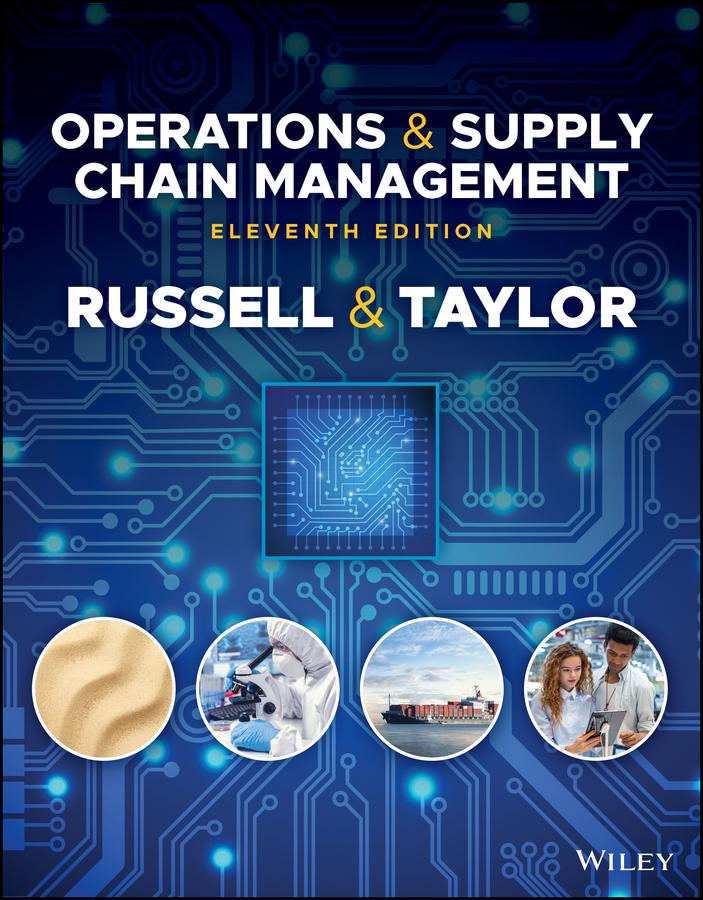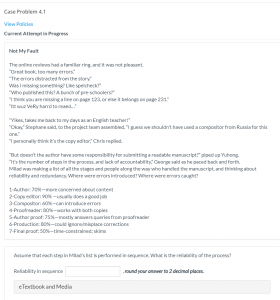
Operations and Supply Chain Management, 11th Edition
By Roberta S. Russell and Bernard W. Taylor
Help your students develop the skills needed to make informed business decisions. Appropriate for all business students, Operations and Supply Chain Management, 11th Edition provides a foundational understanding of operations management processes while ensuring the quantitative topics and mathematical applications are easy for students to understand. Teach your students how to analyze processes, ensure quality, manage the flow of information and products, create value along the supply chain in a global environment, and more with the support of our auto-graded assignments, videos, and cases.
Schedule a Demo Request Instructor AccountWant to learn more about WileyPLUS? Click Here

Inspire efficient concept mastery through adaptive learning.
Close knowledge gaps and accelerate student learning with Adaptive Assignments, which continuously adapt to each student’s needs through individualized, just-in-time feedback and instruction. Assign as pre-lecture to introduce key concepts and post-lecture to reinforce their learning through practice.

Activate knowledge application with real-world context.
Pair cutting-edge business video content from Bloomberg with concepts from the text using our Real-World Video Activities. These assignments provide students with an applied and engaging learning experience to supplement their Operations Management course.
Highlight the importance of supply chain within the operations management framework using the Computer Chip Continuing Case. Giving students a holistic view of the supply chain throughout the semester, the authors open each chapter with a specific example tied to computer chips and supplement that with auto-graded assessment to reinforce learning.
Stimulate student critical thinking skills using our “Along the Supply Chain” activities, which feature Operations Management business applications at top companies around the world.

Cultivate the data analytics and problem-solving skills students need for career success.
Develop the Excel knowledge and skills students need using Gradable Excel, which gives them the opportunity to practice using formulas and functions in a real Microsoft Excel worksheet. With automatic grading and immediate cell-level feedback, students build key skills needed to be competitive in today’s job market while enhancing their understanding of key business concepts.
Provide students with hands-on data experience using our Data Analytics & Business Module. Developed through a partnership with business leaders in the Business-Higher Education Forum (BHEF) to identify the competencies graduates need to be successful in their careers, this module includes industry-validated content that prepares Operations Management students for the changing workforce.
Increase student accountability with auto-graded assignments. Every end of chapter problem from the Russell text is now coded in WileyPLUS! Immediate feedback, algorithmic questions, and just-in-time question assistance available for our practice, homework, and quizzes reinforce concepts and skills for students and save valuable instructor time.
What’s New to This Course
- Adaptive Assignments offer unlimited, dynamic drill and practice focused on conceptual material with immediate feedback, ensuring students are building their confidence and understanding of course material.
- All end of chapter problems from the text are now available to be assigned in WileyPLUS.
- Gradable Excel for selected end-of-topic and end-of-chapter homework questions are available to facilitate student practice of Excel skills.
- Computer Chip Continuing Case opens each chapter with a specific example about computer chips to help show how the OM topics in this edition fit together within a supply chain framework.

Roberta S. Russell is a Professor of Business Information Technology in the Pamplin College of Business at Virginia Polytechnic Institute and State University. She received a Ph.D and a B.S. from Virginia Polytechnic Institute and State University and an M.B.A. from Old Dominion University. Dr. Russell’s primary research and teaching interests are in the areas of operations and supply chain management, with special emphasis on humanitarian and healthcare operations.
She has been published in Journal of Operations Management, Decision Sciences, IIE Transactions, International Journal of Production Research, IEEE Transactions, Annals of Operations Research, Computers and Operations Research, and others. She is also co-author of the Prentice Hall book, Service Management and Operations. Dr. Russell is a member of DSI, ASQ, POMS, and IIE. She is currently serving as President of the APICS Foundation and as co-chair of the Supply Chain Academic Talent Initiative (SCTAI). Dr. Russell is a Certified Fellow in Production and Inventory Management (CFPIM) and is recognized as a Certified Supply Chain Management Professional (CSCP). She is past vice president of POMS, past president of the Southwest Virginia Chapter of APICS, and has held numerous offices in Southeast DSI.
Her consulting experience with IBM, AT&T, Dupont, Courtaulds, Xaloy, Newport News Shipbuilding, and others brings a practical perspective into the classroom. She has received the Pamplin College of Business Certificate of Teaching Excellence on two occasions, the University Certificate of Teaching Excellence, and the MBA Association’s Outstanding Professor Award. Dr. Russell teaches both undergraduate and graduate students in the classroom and online. She is frequently called upon to give workshops on teaching with technology and has incorporated her experiences into the ancillary material that accompanies this text.

Bernard W. Taylor III is the Pamplin Professor of Management Science and Head of the Department of Business Information Technology in the Pamplin College of Business at Virginia Polytechnic Institute and State University. He received a Ph.D. and an M.B.A. from the University of Georgia and a B.I.E. from the Georgia Institute of Technology. He is the author of the book Introduction to Management Science, 11th Edition and co-author of Management Science, 4th Edition, both published by Prentice Hall. Dr. Taylor has published over 80 articles in such journals as Operations Research, Management Science, Decision Sciences, IIE Transactions, Journal of the Operational Research Society, Computers and Operations Research, Omega, and the International Journal of Production Research, among others. His paper in Decision Sciences (with P. Y. Huang and L. P. Rees) on the Japanese kanban production system received the Stanley T. Hardy Award for its contribution to the field of production and operations management.
He has served as President of the Decision Sciences Institute (DSI) as well as Program Chair, Council Member, Vice President, Treasurer, and as the Editor of Decision Line, the newsletter of DSI. He is a fellow of DSI and a recipient of their Distinguished Service Award. He is a former President, Vice President, and Program Chair of the Southeast Decision Sciences Institute and a recipient of their Distinguished Service Award. He teaches management science and production and operations management courses at both the undergraduate and graduate level. He has received the University Certificate of Teaching Excellence on four occasions, the Pamplin College of Business Certificate of Teaching Excellence Award, and the Pamplin College of Business Ph.D. Teaching Excellence Award at Virginia Tech.
1 Introduction to Operations and Supply Chain Management
Supplement to Chapter 1: Operational Decision-Making Tools: Decision Analysis
2 Operations Management
3 Statistical Process Control
Supplement to Chapter 3: Operational Decision-Making Tools: Acceptance Sampling
4 Product Design
5 Service Design
6 Processes and Technology
7 Capacity and Facilities Design
Supplement to Chapter 7: Operational Decision-Making Tools: Facility Location Models
8 Human Resources
Supplement to Chapter 8: Operational Decision-Making Tools: Work Measurement
9 Project Management
10 Supply Chain Management Strategy and Design
11 Global Supply Chain Procurement and Distribution
Supplement to Chapter 11: Operational Decision- Making Tools: Transportation and Transshipment Models
12 Forecasting
13 Inventory Management
Supplement to Chapter 13: Operational Decision-Making Tools: Simulation
14 Sales and Operations Planning
Supplement to Chapter 14: Operational Decision-Making Tools: Linear Programming
15 Resource Planning
16 Lean Systems
17 Scheduling

